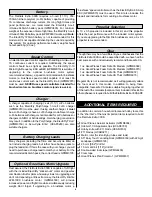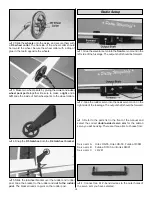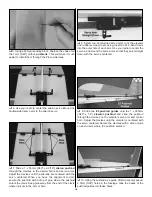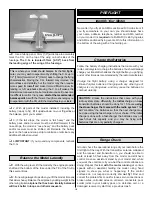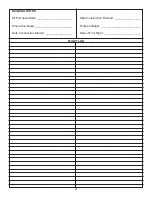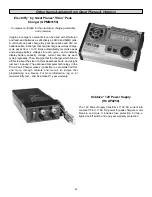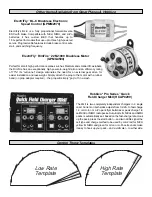
❏
4. Check all the control surfaces to see if they are
centered. Since you set the center points as you set up the
linkages, they should already be very close. Use your radio’s
trims on the transmitter to center the controls.
❏
5. Make certain that the control surfaces and the motor
respond in the correct direction as shown in the diagram. To
operate the motor, you may have to “arm” your ESC. Follow
the instructions that came with your ESC to do this. If any of
the controls respond in the wrong direction, use the servo
reversing in the transmitter to reverse the servos connected
to those controls. Be certain the control surfaces have
remained centered. Adjust if necessary.
To simplify setup, the high-rate (3-D) control throws for this
model are automatically set by the geometry of the included
hardware. We do recommend, however, that you perform a
quick check as described below to make sure the throws are
set up correctly.
Note: If your radio has the capability, low-rates will make it
easier to perform precision aerobatics. We recommend 40%
endpoints for all low-rate throws. If your radio does not have
low-rates, set up the plane using only the high-rate throws.
Additionally, you may want to use the exponential function to
soften the control response around center. This is largely a
matter of personal taste, but helps many pilots balance the
extreme throws needed for 3-D flying with the need to make
small corrections when in normal flight.
We recommend setting up your airplane according to the
following table
as a starting point. However, setting up
models of this type is largely a matter of personal taste. We
encourage you to tune the throws to your taste as you get
more familiar with the aircraft. Many expert 3-D fliers choose
to increase their high-rate travel by using higher endpoints.
To set the throws, use the angle templates on the back cover
of this manual to verify that you are in the ballpark.
If you are not able to achieve these control throws, double-check
your pushrod hookup and make sure any control surfaces in
question are operating smoothly. If you have a computer radio
also make sure your endpoint adjustments are properly set.
At this stage the model should be in ready-to-fly condition
with all of the systems in place including the motor, the
propeller, the battery, and the radio system.
More than any other factor, the C.G. (balance point) can
have the greatest effect on how a model flies, and may
determine whether or not your first flight will be
successful. If you value this model and wish to enjoy it for
many flights, DO NOT OVERLOOK THIS IMPORTANT
PROCEDURE. A model that is not properly balanced will
be unstable and possibly unflyable.
Balance the Model (C.G.)
Set the Control Throws
4-CHANNEL
TRANSMITTER
TRANSMITTER
4-CHANNEL
TRANSMITTER
4-CHANNEL
TRANSMITTER
4-CHANNEL
18

